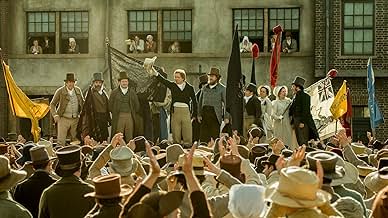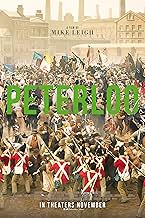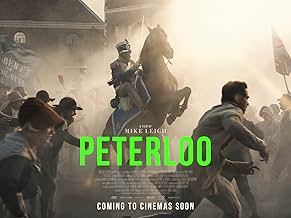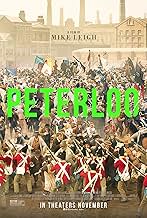NOTE IMDb
6,5/10
5,8 k
MA NOTE
L'histoire du massacre de Peterloo en 1819 où les forces britanniques attaquèrent un rassemblement pacifique en faveur de la démocratie à Manchester.L'histoire du massacre de Peterloo en 1819 où les forces britanniques attaquèrent un rassemblement pacifique en faveur de la démocratie à Manchester.L'histoire du massacre de Peterloo en 1819 où les forces britanniques attaquèrent un rassemblement pacifique en faveur de la démocratie à Manchester.
- Réalisation
- Scénario
- Casting principal
- Récompenses
- 4 victoires et 8 nominations au total
Avis à la une
This is the first review I've ever done, but was moved to do so by some reviews that I have read on here since watching the film. So apologies to you experts, but here's my tuppenceworth. On the down side, a bit overlong, could have been a bit less wordy and faster paced. But, I left the cinema with the same feeling that I did in the early 70s after seeing Soldier Blue: stunned by the brutality of "the authorities" over the disenfranchised. Forensic in its drama/documentry approach and absolutely true to events (I have since checked various historical sources). This is what happens when people feel they lack a voice and does resonate with today's UK. I thought the lighting was superb and the epic, grand scale setting rare in a UK film. A must watch for teenagers who will not have heard of this event in history at school.
As with most movies today, the extremes are over-represented and the underlying issues barely addressed. England was reeling from a Napoleanic, banker-funded war, ending in oppressive debt for the major powers of Europe. The Bank of England and the Bank of France were both formed to lend money to their respective governments, with few constraints on the pyramiding, in order to fund regular wars. The French revolution was trying to spread its socialist conclusions. Men are represented as either cruel, money-grubbing wealthy industrialists or poor, woe-is-me peasant labor, although one could hardly call people who had several sets of clothes, a house and sets of dishes as poor. The gratuitous men-oppress-their-more-intelligent-women folk is consistent with modern social justice bleatings. Consequently, what we see is the plight of what the French called the bourgeoisie, or the merchant and skilled labor class. The entrenched oligarchies were hanging on to their power, generated by industrial technological expansions (in this case the mechanical loom), which ironically needed skilled laborers and supporting merchants, who also were gaining wealth, counter to the woe-is-me picture. Much of the problem was the government-imposed lack of producers' and laborers' ability to negotiate the price of their labor and the markets for their products. The many government-oligopoly controls on cloth production are not presented, but were responsible for most of the tension. Of course, these issues would hardly sell to uninformed viewers.
As with the onset of the French revolution, the key issue is never quite resolved in these movies, or in the social justice bleatings of today: after the dust settles, who will be in charge and what will the new rules be? Will the current oppressors be replaced by worse oppressors? Meet the new boss, same as the old boss, both in labor and management. Government meddling has and will cause tragedy.
As with the onset of the French revolution, the key issue is never quite resolved in these movies, or in the social justice bleatings of today: after the dust settles, who will be in charge and what will the new rules be? Will the current oppressors be replaced by worse oppressors? Meet the new boss, same as the old boss, both in labor and management. Government meddling has and will cause tragedy.
Like most working-class Brits, I knew nothing of Peterloo (and I am from Manchester into the bargain).
Mike Leigh has done an excellent job, documenting this momentous event in British history, an event conveniently airbrushed out of my secondary school education. Imagine that.
A good 2.5 hrs long, it would make a decent 12 part Netflix drama. Though, he'd never get the funding for that.
It is long, it is educational, it is historical, it is incredibly worthy. Watch it and draw parallels with the Britain of today. FPTP electoral system, zero-hours contracts, food banks, Brexit, et al.
i gave it a 9.
Mike Leigh has done an excellent job, documenting this momentous event in British history, an event conveniently airbrushed out of my secondary school education. Imagine that.
A good 2.5 hrs long, it would make a decent 12 part Netflix drama. Though, he'd never get the funding for that.
It is long, it is educational, it is historical, it is incredibly worthy. Watch it and draw parallels with the Britain of today. FPTP electoral system, zero-hours contracts, food banks, Brexit, et al.
i gave it a 9.
"Rise like Lions after slumber in unvanquishable number- Shake your chains to earth like dew Which in sleep had fallen on you- Ye are many-they are few." Shelley, from The Masque of Anarchy
No contemporary director depicts and loves the working class better than Mike Leigh: look at Secrets and Lies for the best example. Believing that not enough people know about the massacre in 1819 in Manchester, where the British army slaughtered 18 and wounded scores of commoners peacefully assembling for liberty and rights, Leigh filmed Peterloo, the popular name for the uprising.
With an ear for local locutions and pompous preening, Leigh alternates between the people and their monarchial rulers, showing the sincerity of the marchers and the fear of the magistrates, who wish for nothing more than a Waterloo to stem the French-revolution-like yearnings of the folk. When administrators order the soldiers to squash the gathering, it's the beginning of responsible press reporting the malignity of entrenched rulers.
Leigh's longtime cinematographer, Dick Pope, has exceptional shots of the laborers and their homes to rival the best work of Millet and Courbet. The framing arches and rolling fields provide Pope with contours and colors to complement the dignity and vitality of the people.
However, it's Leigh's unfailing ear for diction and eye for metaphor that distinguish him as a David Lean of the working class. Contrasting the magistrates clustered around drafting the warrants for the crowd and the almost lyrical happiness of the assembly not only sets up the worlds of sad and happy, but they also heighten the terror as the innocent are vanquished by the proud.
Out of this debacle came a strong press that began and never stopped evaluating the ruling class. All hail the emergence of the Manchester Guardian.
"Let a great Assembly be Of the fearless and the free On some spot of English ground Where the plains stretch wide around." Shelley
No contemporary director depicts and loves the working class better than Mike Leigh: look at Secrets and Lies for the best example. Believing that not enough people know about the massacre in 1819 in Manchester, where the British army slaughtered 18 and wounded scores of commoners peacefully assembling for liberty and rights, Leigh filmed Peterloo, the popular name for the uprising.
With an ear for local locutions and pompous preening, Leigh alternates between the people and their monarchial rulers, showing the sincerity of the marchers and the fear of the magistrates, who wish for nothing more than a Waterloo to stem the French-revolution-like yearnings of the folk. When administrators order the soldiers to squash the gathering, it's the beginning of responsible press reporting the malignity of entrenched rulers.
Leigh's longtime cinematographer, Dick Pope, has exceptional shots of the laborers and their homes to rival the best work of Millet and Courbet. The framing arches and rolling fields provide Pope with contours and colors to complement the dignity and vitality of the people.
However, it's Leigh's unfailing ear for diction and eye for metaphor that distinguish him as a David Lean of the working class. Contrasting the magistrates clustered around drafting the warrants for the crowd and the almost lyrical happiness of the assembly not only sets up the worlds of sad and happy, but they also heighten the terror as the innocent are vanquished by the proud.
Out of this debacle came a strong press that began and never stopped evaluating the ruling class. All hail the emergence of the Manchester Guardian.
"Let a great Assembly be Of the fearless and the free On some spot of English ground Where the plains stretch wide around." Shelley
If I have a criticism of this film, it would be that it's half an hour too long. Mike can be a bit self indulgent, there where a few scenes that were just there for colour. Technically accomplished, well acted, and faithfully accurate to the history. If you like social history you will not be disappointed.
Le saviez-vous
- AnecdotesThe film was released 200 years after the Peterloo Massacre.
- GaffesThe young Waterloo veteran who continues to wear his redcoat during the film can be seen in one shot with Corporal stripes whereas the rest of the film his tunic is that of a Private.
- Citations
Prince Regent: I know what is good for my people better than they know themselves!
- ConnexionsFeatured in Granada Reports: 16 August 2018: Evening Bulletin (2018)
Meilleurs choix
Connectez-vous pour évaluer et suivre la liste de favoris afin de recevoir des recommandations personnalisées
Détails
- Date de sortie
- Pays d’origine
- Sites officiels
- Langue
- Aussi connu sous le nom de
- La tragèdia de Peterloo
- Lieux de tournage
- Hebden Bridge, West Yorkshire, Angleterre, Royaume-Uni(Workers being drilled before marching)
- Sociétés de production
- Voir plus de crédits d'entreprise sur IMDbPro
Box-office
- Montant brut aux États-Unis et au Canada
- 151 971 $US
- Week-end de sortie aux États-Unis et au Canada
- 26 002 $US
- 7 avr. 2019
- Montant brut mondial
- 2 159 214 $US
- Durée2 heures 34 minutes
- Couleur
- Mixage
- Rapport de forme
- 1.85 : 1
Contribuer à cette page
Suggérer une modification ou ajouter du contenu manquant









































